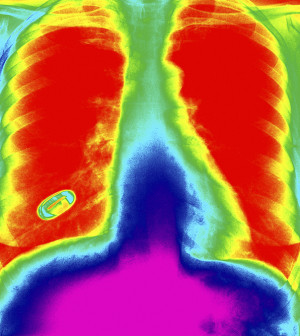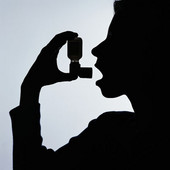- Could Your Grocery Store Meat Be Causing Recurring UTIs?
- Are You Making This Expensive Thermostat Error This Winter?
- Recognizing the Signs of Hypothyroidism
- 10 Strategies to Overcome Insomnia
- Could Artificial Sweeteners Be Aging the Brain Faster?
- Techniques for Soothing Your Nervous System
- Does the Water in Your House Smell Funny? Here’s Why
- Can a Daily Dose of Apple Cider Vinegar Actually Aid Weight Loss?
- 6 Health Beverages That Can Actually Spike Your Blood Sugar
- Treatment Options for Social Anxiety Disorder
Pneumonia in Early Childhood Tied to Higher Odds of Asthma


Children who contract pneumonia during the first three years of life appear to face a higher risk of developing asthma, new research suggests.
These findings raise concern that early childhood respiratory problems may have an enduring and negative impact on growing lungs.
“This supports the idea that the roots of chronic illness in adult life may be the events that occur in early life,” said study co-author Dr. Fernando Martinez, a professor of pediatrics and director of the Arizona Respiratory Center at the University of Arizona in Tucson.
“Early life is a time when organs are developing very fast, and can be affected and altered by outside stimuli or negative events, which may then carry into adulthood,” he said.
“So here,” added Martinez, “we have shown that when you have a severe episode of pneumonia in early life there are consequences, such as lower levels of lung function and respiratory symptoms.”
However, the authors also pointed out that this study can’t prove that the early pneumonia definitively caused asthma or later impaired lung function. It’s possible that children who developed pneumonia may have already had impaired lung function that made them more susceptible to getting pneumonia, according to the study.
Martinez and his colleagues discuss their findings in the April issue of Pediatrics.
About 25 million Americans have asthma, including as many as 7 million children, according to the U.S. National Heart, Lung, and Blood Institute.
For the study, the authors focused on nearly 1,250 men and women born between 1980 and 1984. From birth, all were enrolled in the ongoing Tucson Children’s Respiratory Study.
All instances of lower respiratory illness were recorded during the first three years of life. After that period, the children were divided into three groups: those who had pneumonia in that time frame, those who experienced another type of respiratory issue, and those who had neither.
In addition, asthma questionnaires were completed by parents until the children reached the age of 16, and then by the participants themselves from ages 16 through 29.
Allergy exams were conducted at age 6, smoking histories were provided starting at age 16, and all participants underwent at least one lung function (spirometry) exam at ages 11, 16, 22 and/or 26. That test assesses the volume and speed of air as it’s exhaled and inhaled.
The researchers found that children who had early lower respiratory illnesses, and particularly those who had pneumonia, had a higher risk of impairment in lung function as they reached their teen and adult years, compared to people who didn’t have early lung illnesses.
Pneumonia was associated with nearly double the risk of later asthma or wheezing, according to the study. Other types of lower respiratory illness in childhood boosted the risk (to a lesser degree) for later wheezing and impaired airway function, the study found.
“It is not that everybody who has these illnesses in early life will have these problems as adults,” acknowledged Martinez.
“It’s just that it makes them more susceptible. And from the point of view of public health, that’s a very important point. Some people are lucky. But that’s just luck. The risk remains that the outcome for many will not be as good, which suggests that we should focus on preventing negative events like pneumonia in early life in order to prevent chronic respiratory illness in adult life.”
The study authors also expressed concern that these findings suggest that early pneumonia or other lower respiratory illness early in life might also increase the risk of developing other lung conditions later in life, such as chronic obstructive pulmonary disease (COPD).
Dr. Len Horovitz, an internist and pulmonologist at Lenox Hill Hospital in New York City, said the study’s findings make sense.
“It’s really logical, and not surprising,” he said. “We clearly see asthma develop in kids with prematurity or with a history of pneumonia and other lower respiratory infections. We also see breathing tube damage, which leaves the lungs particularly vulnerable to infection going forward.”
Horovitz stressed that childhood pneumonia survivors need to avoid smoking, which “if it enters into the equation is really going to be a problem.”
He also advocated for regular pulmonary function testing to spot, diagnose and treat asthma or COPD as early as possible.
He described the testing. “It’s not invasive. But you do have to understand how it works, which is like blowing out the candles in a birthday cake with maximum force, and that can be an obstacle for any patient, particularly when they’re young. Still, it’s important that it be tried, and you can certainly get a feeling for lung capacity and a good idea of what’s going on.”
More information
There’s more on asthma at the U.S. National Heart, Lung, and Blood Institute.
Source: HealthDay
Copyright © 2026 HealthDay. All rights reserved.










